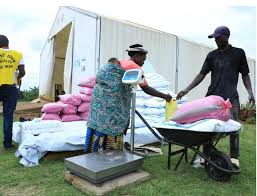EU, WFP Boost Food Security and Self-Reliance for Refugees in Uganda

The European Union has committed EUR 5 million to support the United Nations World Food Programme (WFP) in delivering income-generating and nutritional initiatives for refugees and host communities in Uganda.
Uganda is home to 1.9 million refugees and asylum seekers, making it the largest refugee-hosting country in Africa. Despite the government’s progressive refugee policy—granting freedom of movement and the right to work—economic opportunities remain limited in many settlements.
“Empowering refugees in Uganda to become self-reliant has never been more important,” said Genevieve Chicoine, WFP’s Acting Country Director in Uganda. “This vital contribution from the European Union will enable WFP to support thousands of refugees and host communities with the skills they need to earn a living and put food on the table.”
The funding will directly benefit 12,600 refugees in the Nakivale and Oruchinga settlements, as well as 5,400 individuals from the host communities.
Programmes will focus on sustainable farming techniques like regenerative agriculture, financial literacy, and nutritional support for vulnerable groups such as pregnant and breastfeeding women.
“This partnership reflects a shift from delivering aid to delivering opportunity,” said Guillaume Chartrain, Deputy Head of Delegation for the European Union in Uganda. “Refugees and host communities are gaining the tools they need to shape their own futures. By investing in people’s skills and potential, we are supporting more stable, self-reliant communities—and that benefits everyone.”
The initiative falls under the European Union’s Action for Protection, Assistance and Durable Solutions for Displaced Populations in Sub-Saharan Africa (EUPADS), which aims to address the root causes of displacement while strengthening national refugee policies.
WFP’s current operations support around 660,000 refugees in Uganda with a combination of cash-based transfers, in-kind food assistance, and resilience-building programmes.
However, the agency is grappling with significant funding gaps. In May, WFP was forced to halt food assistance for nearly one million refugees and cut rations for others to just 22 percent of their daily needs.
“While humanitarian support remains critical, sustainable solutions are what will make a lasting impact,” Chicoine emphasised. “We are working to ensure that every investment leads to long-term food security and dignity for displaced families.”
The EU’s broader partnership with Uganda spans green energy, inclusive economic growth, governance reforms, and human rights. As one of the largest humanitarian donors globally, the EU continues to play a central role in Uganda’s development and refugee response efforts.
The new funding marks a hopeful shift from emergency aid to sustainable development, reinforcing Uganda’s role as a regional model for progressive refugee integration.



0 Comments